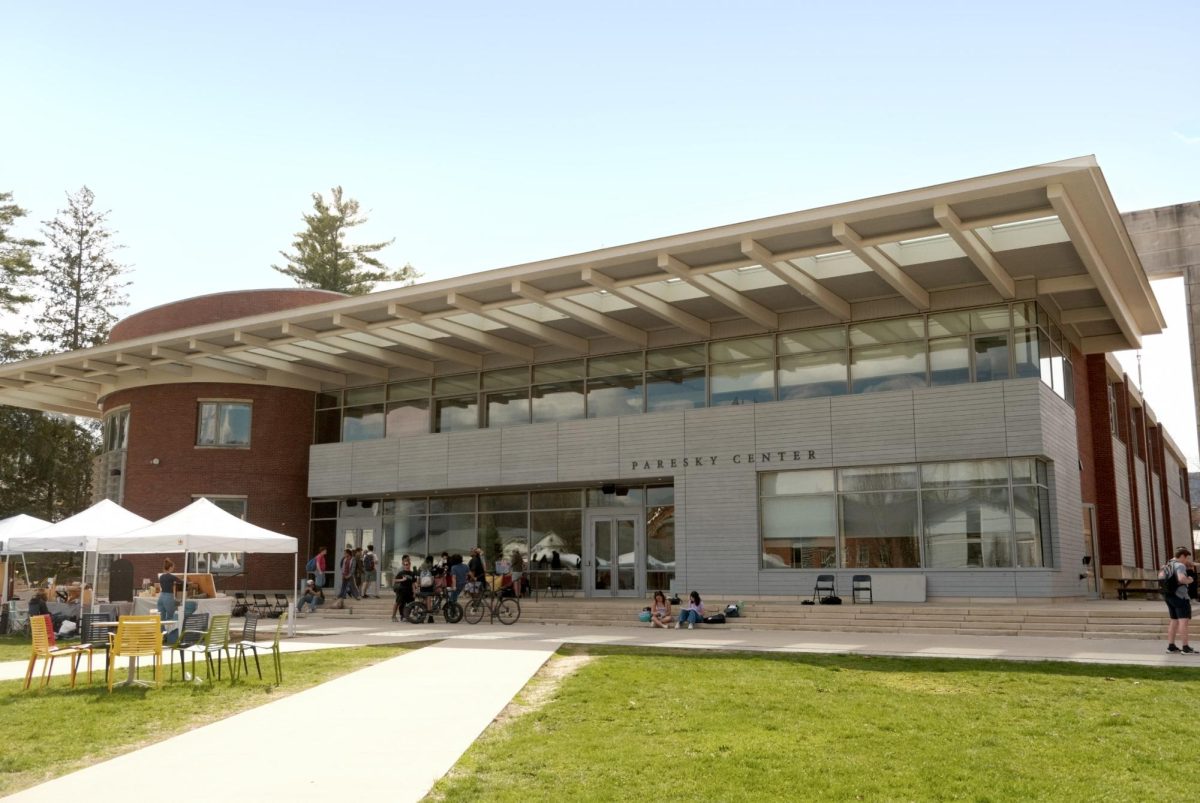
The Board of Trustees decided not to divest the College’s endowment from weapons manufacturers and suppliers to the Israel Defense Forces (IDF) during its June 1 meeting, adopting in full the recommendations set forth by the Advisory Committee on Shareholder Responsibility (ACSR) in its May 23 report. President of the College Maud S. Mandel announced the decision on June 11 in an all-campus email co-written by Liz Robinson ’90, chair of the Board of Trustees.
Mandel’s email also noted that the Board of Trustees decided not to adopt exclusionary environmental, social, and governance (ESG) standards, or rules that would prohibit certain investments. The College administration plans to increase transparency around endowment investing, potentially by enhancing the annual investment reports and hosting community workshops, Mandel wrote in the email. All of the Board of Trustees’ decisions follow the recommendations offered by the ACSR in its May 23 report.
Twenty-two of the 24 trustees — as well as Mandel, who serves on the Board of Trustees in an ex officio capacity — were present at the June 1 meeting, Mandel wrote in an email to the Record. While several other motions came to a vote before the board, the trustees reached consensus on the decision not to divest through discussion, a procedure the Board of Trustees often follows, Mandel wrote. “What’s relevant is the consensus,” Mandel added in an email to the Record. The ACSR was not involved with deliberations beyond issuing the report, Provost Eiko Maruko Siniawer wrote in an email to the Record.
Following deliberations, the Board of Trustees decided that divestment and exclusionary ESG standards violate its fiduciary responsibility. “The Board does not believe that the endowment should be used to advocate positions on world affairs,” Mandel wrote in the all-campus email. Regarding the practicality of divestment, Mandel addressed the argument by Jews for Justice (J4J) and the College’s chapter of Students for Justice in Palestine (SJP) that the College could invest with alternative fund managers, like those referenced in the comprehensive report jointly issued by the groups on May 1. Since the endowment is invested entirely through third-party fund managers, an exclusionary change to the composition of the College’s investments would compromise its partnerships with those “key investment managers,” she wrote.
“Our view [is] that the College’s foremost duty is to make the highest-quality liberal arts education available and affordable to a diverse population of future leaders… The Board was not persuaded that narrowing our focus to an exclusionary ESG-driven approach would be either practical or an advance over our current, rigorous and holistic process,” she wrote, characterizing the view of the Board of Trustees. “Subordinating overall investment strategy, in which performance and impact are assessed over many decades, to the volatility of geopolitical events and shifting ESG assessments would introduce significant new risk.” Mandel added that the Board of Trustees is “unwilling to accept increased risk” when the endowment provides 55 percent of the annual operating budget.
The Investment Office’s annual investment reports provide some information about the management of the College’s $3.48 billion endowment. All of the College’s endowment is managed by fund managers, which are third-party companies whose business is investing others’ funds. In 2023, the annual investment report reported that about 38 percent of the endowment was managed by hedge funds, a kind of fund manager that manages larger assets like endowments. They often keep their fund management practices confidential, allowing them to engage in riskier investment strategies. The Investment Office does not currently disclose publicly which managers the endowment funds are invested with.
The Board of Trustees’ decisions come in the wake of encampments on college campuses across the nation calling for changes to institutional investment practices in response to the war in Gaza. On May 1, after establishing an encampment on Sawyer Quad, SJP and J4J published demands that the College “implement increased transparency and ethics” in its fiscal practices and “divest [its] endowment from weapons manufacturing supplying Israel.”
SJP and J4J maintained the encampment for 13 days, closing it after the Board of Trustees agreed to meet with representatives from both groups before two Board meetings. The first of the meetings took place on May 30, and the second will be held in September. Mandel wrote in an email to the Record that she expects the September meeting to focus on questions related to endowment transparency, though she added that SJP and J4J representatives will likely present additional agenda items.
In advance of the May 30 meeting, the ACSR released a report responding to two requests related to endowment and investment practices filed by J4J and Professor of Philosophy Steven Gerrard. The request set forth by J4J, which it submitted in November 2023, asked the committee to recommend that the College divest from weapons manufacturers supporting the IDF, institute a “blanket” exclusionary ESG standards for investments, and establish the ACSR as a standing committee. In a response to J4J’s proposal, Gerrard requested that the ACSR recommend against divestment, framing it as a violation of the College’s ethical imperative toward “institutional restraint,” or letting students think for themselves. Gerrard did not respond to a request for comment in time for publication. The ACSR recommended against J4J’s three requests but endorsed increased endowment transparency by the Investment Office.
SJP expressed appreciation for the steps towards transparency but emphasized its hope for greater change in endowment policies. “We acknowledge the direction outlined by President Mandel regarding transparency, and while these are steps in the right direction, we reiterate that they are not enough,” an SJP spokesperson, who wished to remain anonymous, wrote in a statement they shared with the Record. In its statement, SJP disagreed with the premises of the Board of Trustees’ decision. “We are also extremely disappointed by some of the biases present in their rationale for refusing ESG considerations,” the SJP spokesperson wrote. “We vehemently refuse the narrative that our lives as students matter any more than the lives of students across the globe, an elitist and racist narrative that was present throughout the email President Mandel sent out.”
The ACSR’s recommendation that the Investment Office increase transparency contained several perspectives on the extent of implementation, ranging from deference to the Investment Committee to mandating the Investment Office to respond to specific questions about the public holdings in the portfolio. Efforts to increase transparency into the work of the Investment Office and the management of the endowment will begin over the summer and into the fall, Mandel wrote in the all-campus email. “This includes making the community aware of our processes for evaluating investment managers’ approach to environmental, social, and governance issues,” she added. “Efforts might include enhancements to our annual investment reports and community learning programs.”
Currently, the Investment Office has no public set of ESG guidelines, though Mandel wrote that the Board of Trustees hopes to increase transparency concerning the evaluation of investment managers. “When we evaluate managers we look closely at each manager’s investment approach, including the types of information they factor into their investment decisions on the college’s behalf,” she wrote in an email to the Record. “Our analyses naturally include attention to multiple factors, including those associated with a manager’s ESG framework. This is exactly the kind of thing we look forward to discussing with the community in the fall.”
Mandel noted in the all-campus email the Board of Trustees’ desire to see “human suffering alleviated and injustices righted” and highlighted the College’s educational efforts toward those ends. “This year, for example, members of our academic community (often with support from endowed funds) taught courses and organized more than 30 lectures, workshops, teach-ins and other events about the conflict and the region’s history and current affairs,” she wrote.
Mandel’s email also addressed a letter written by a group named Williams Alums Against Genocide, who did not name individual authors, that called on alums to withhold donations to the College until it “publicly commits to transparency on investments and divestment from companies that profit from Israeli apartheid and genocide.” The letter, which was published on April 30, garnered 800 signatures as of June 11.
“We would only point out that everything current students enjoy at Williams was paid for, in significant part, by the endowment and underlying gifts from thousands of alumni over many generations,” Mandel wrote. “Thus the main people harmed by any withholding of gifts are future students.”














